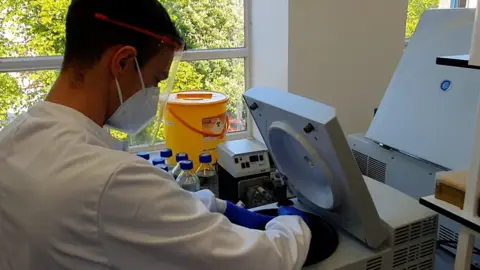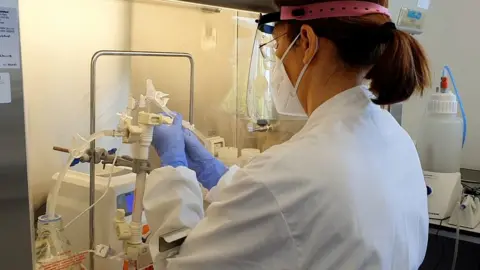Coronavirus: Sewage study could predict second Covid-19 peak
 BBC
BBCAnalysing sewage could help scientists predict a second peak of Covid-19 up to two weeks before people become symptomatic.
A team from Bangor University has been looking at samples from water treatment works across Wales in a bid to trace how many people have been infected.
The team has previously tracked norovirus through the sewage system.
People start to shed the virus in faeces up to two weeks before the onset of symptoms.
Prof Davey Jones, who is leading the School of Natural Sciences study, said: "It may be gives us a two weeks window in which we can actually monitor whether Covid is going up or down in the population before it actually hits the hospitals."

He said it was an effective method for tracing viruses partly because it is possible to capture data on the majority of the population in a relatively cheap and simple way.
"We want to understand where and when Covid-19 infections are occurring within Wales," he said.
"So far what we've shown is that in north-west Wales the number of virus particles in the sewage is really, really low, suggesting there is almost no Covid-19 circulating in the population.
"In contrast in north-east Wales and south-east Wales the numbers of Covid-19 virus in waste water are really, really high suggesting they are infection hot spots at the moment."
He said the findings were in line with what they were expecting, given the numbers of confirmed cases in Wales.
"It's important to understand how many cases we have in the country, but it's also important to understand how many asymptomatic carriers that we have," he said.
"Those are the people who might have very mild symptoms or no symptoms at all. It could be that they are an important source of infection within the community."
He said in Wales about 75% of the population were connected to 21 individual treatment plants operated by Welsh Water.
"Looking at the genetic code of the virus we can see whether different parts of Wales have different areas being infected by different strains of the virus," he said.
"If we want to we could also drill into individual regions within a city such as Cardiff and evaluate whether different parts of the city are more infected than others."

- EASY STEPS: How to keep safe
- A SIMPLE GUIDE: What are the symptoms?
- GETTING READY: What is the UK's 'delay' phase?
- TRAVEL PLANS: What are your rights?
- IN-DEPTH: Coronavirus pandemic

Steve Wilson, managing director of waste water services for Dwr Cymru Welsh Water, said: "We are monitoring the amount of virus that's present in the community every week and actually over the last four to five weeks there has been a steady decrease in the amount of virus week on week.
"So it's an effective way of understanding whether the virus is spreading further or actually the lockdown and containment strategies we are all adopting is having the desired effect."
A similar study is under way at Newcastle University.
A spokesperson for the UK government's Department for Environment, Food and Rural Affairs (Defra) said it was "actively engaging with the research community and government scientific advisers to investigate whether monitoring waste water could be used as a way of tracking the prevalence of the virus".
A Welsh Government spokesman said: "The research proposal has been shared with the technical advisory group and we are actively in dialogue with the research lead at Bangor University to discuss how the data can contribute to our understanding of the virus."
